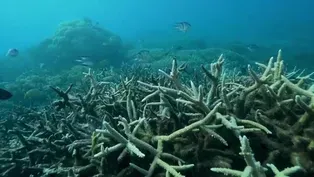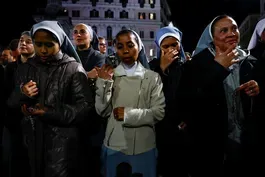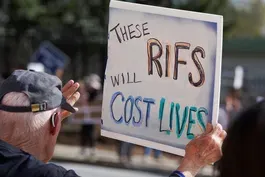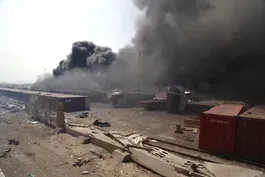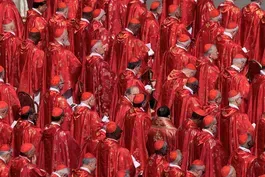
April 26, 2025 - PBS News Weekend full episode
4/26/2025 | 26m 45sVideo has Closed Captions
April 26, 2025 - PBS News Weekend full episode
April 26, 2025 - PBS News Weekend full episode
Problems with Closed Captions? Closed Captioning Feedback
Problems with Closed Captions? Closed Captioning Feedback
Major corporate funding for the PBS News Hour is provided by BDO, BNSF, Consumer Cellular, American Cruise Lines, and Raymond James. Funding for the PBS NewsHour Weekend is provided by...

April 26, 2025 - PBS News Weekend full episode
4/26/2025 | 26m 45sVideo has Closed Captions
April 26, 2025 - PBS News Weekend full episode
Problems with Closed Captions? Closed Captioning Feedback
How to Watch PBS News Hour
PBS News Hour is available to stream on pbs.org and the free PBS App, available on iPhone, Apple TV, Android TV, Android smartphones, Amazon Fire TV, Amazon Fire Tablet, Roku, Samsung Smart TV, and Vizio.
Providing Support for PBS.org
Learn Moreabout PBS online sponsorshipJOHN YANG: Tonight on PBS News Weekend, world leaders and throngs of mourners bid a solemn farewell to Pope Francis as President Trump and Volodymyr Zelenskyy meet at the Vatican to discuss hopes for lasting peace.
Then, how NIH staffing shortages and layoffs threaten to delay the rollout of a potential breakthrough in the fight against cancer.
And we explore the worldwide crisis affecting coral reefs that scientists blame on global warming.
WOMAN: It's very alarming.
So I think people really need to recognize what they're doing, you know, by the inaction you are it's the kiss of death for coral reefs.
(BREAK) Good evening.
I'm John Yang.
Pope Francis was laid to rest today after a solemn Requiem Mass outside St. Peter's Basilica in the Vatican.
Our coverage begins with special correspondent Malcolm Brabant in Rome.
MALCOLM BRABANT (voice-over): Beneath an azure Roman skin, a quarter of a million people crammed into St. Peter's Square to glorify the former Argentinian nightclub bouncer who history will remember as a pope of peace.
They came to participate in the grandest of funeral services, with rituals dating back centuries.
They saw kings and princes and presidents take their places beneath a fierce April sun, including William, the heir to the British throne.
The former U.S. President Joe Biden and his wife Jill slipped into the less hallowed seats opposite the scarlet phalanx of cardinals who in May will be sequestered to choose the next pope.
Francis was universally acclaimed as an extraordinary pontiff and in keeping with his peace loving spirit, behind the scenes, there was a significant attempt to broker a truce between Ukraine and its Russian invaders.
Before paying his respects at the coffin, President Trump sat down with Ukraine's President Zelenskyy for the first time since their rancorous confrontation in the Oval Office two months ago.
Trump reportedly pressured Zelenskyy to accept a plan in which Ukraine will formally surrender territory occupied by Russia, including the Crimean Peninsula, as well as granting the United States an enormous stake in Ukraine's mineral wealth.
As far as the White House is concerned, this is the only feasible deal.
On the X social media platform, Zelenskyy described the meeting as very symbolic and potentially historic.
Thanking Trump, he said he was hoping for results on everything covered in their discussions, protecting the lives of Ukrainians, a full and unconditional ceasefire, and a reliable and lasting peace that would prevent another war from break out.
But in a post on his Truth Social network, President Trump launched a broadside against Russia's Vladimir Putin.
He said there was no reason to shoot missiles into civilian areas.
It makes me think, he said, that maybe Putin doesn't want to stop the war and is just tapping me along.
When Trump emerged into St. Peter's Square, he was met with silence.
The contrast with Zelenskyy's appearance could not have been greater.
Warm applause greeted the Ukrainian president as he took his seat.
And then the grand ceremony began in earnest with the coffin carried from the basilica into the square.
The congregation was addressed by 91-year-old Italian Cardinal Giovanni Battista Re.
CARDINAL GIOVANNI BATTISTA RE, Dean of the College of Cardinals (through translator): In this majestic St. Peter Square where Pope Francis celebrated the Eucharist so many times and presided over great gatherings over the past 12 years, we are gathered with sad hearts in prayer around his mortal remains.
MALCOLM BRABANT (voice-over): With talks about peace in Ukraine dominating the diplomatic agenda, the cardinal reminded the throng of Francis despair at the futility of war.
GIOVANNI BATTISTA RE (through translator): Faced with the raging wars of recent years, with their inhuman horrors and countless deaths and destruction, Pope Francis incessantly raised his voice imploring peace.
War, he said, is only the death of people and the destruction of homes, hospitals and schools.
MALCOLM BRABANT (voice-over): Then the cardinal named what some commentators interpreted as a barbed missive at President Trump and his war on the Mexican border.
GIOVANNI BATTISTA RE (through translator): War always leaves the world worse than it was before.
It is always a painful and tragic defeat for everyone.
Build bridges, not walls was an exhortation he repeated many times.
MALCOLM BRABANT (voice-over): In conclusion, Cardinal Battista Re appealed to Pope Francis in the afterlife.
GIOVANNI BATTISTA RE (through translator): Pope Francis used to conclude his speeches and also his private meetings by saying, do not forget to pray for me now.
Dear Pope Francis, we ask you to pray for us, and we ask you from heaven to bless the Church, bless Rome, and bless the whole world.
MALCOLM BRABANT (voice-over): After communion and an invocation to the saints and martyrs, the funeral service came to an end.
The coffin was placed on a modified popemobile and driven through the streets for Francis final earthly journey.
The route took the coffin past some of Rome's most famous landmarks, including the Colosseum and tens of thousands of people who stood several rows deep to say farewell.
Francis is the first pope in more than a century to be laid to rest outside the Vatican.
Thousands clustered around the Basilica Santa Maria Maggiore to witness the climax of an emotional day.
Consistent with his commitment to the poor and dispossessed, Francis invited refugees, prisoners, transsexuals and others in need to be his ultimate guard of honor.
Before the Vatican's master of ceremonies, Cardinal Kevin Farrell blessed the tomb and placed a seal on the coffin.
A Swiss guard gave a final salute, and Franciscus, as he was known in Latin, was left at peace among his people and with his God.
For PBS News Weekend, I'm Malcolm Brabant in Rome.
JOHN YANG: Today's funeral and burial marked the beginning of nine days official mourning at the Vatican.
Cardinals will lead masses each day and the words of their homilies, their reflections on the scripture readings that day, will undoubtedly be closely examined and analyzed for clues about what's on their minds as they prepare to elect a new pope.
John Allen has covered the Vatican for 30 years.
He's editor of Crux, an online site that covers the Vatican and the Catholic Church.
John, practically all the cardinals who are eligible to vote.
That means the cardinals who are under the age of 80 were at today's funeral.
They'll be in Rome leading up to the conclave.
In those days, are they going to be talking to each other, either formally or informally, about who they might see as the next pope?
JOHN ALLEN, The Crux: Oh, absolutely.
They'll be talking to one another about who they see as the next pope.
That is, after all, the business they have been called to Rome to perform.
And so in these daily meetings of cardinals for their meeting every morning, called the General Congregation meetings, some of that is procedural, but some of it allows cardinals the opportunity to talk to one another about what they see as the issues facing the church, to sort through where the church stands and where these cardinals believe it needs to go.
JOHN YANG: Specifically, at this time right now, what are some of the considerations the cardinals will be thinking about?
JOHN ALLEN: I think fundamentally, the issue that facing every conclave is do you want to keep going in terms of the papacy that just ended, or do you want to try something else?
But beyond that, there is a complicated sort of bushel basket full of issues they'll be looking at from geopolitics.
We're entering an era where old alliances seem to be falling apart and new ones are coming into view.
And they'll want somebody who can steer the church safely through those storms, to internal church debates over contentious matters such as women and outreach to the LGBTQ community, to more broad social concerns such as migration and climate change and poverty, really trying to come to some sort of rough consensus.
And of course, when you have 135 alpha males, each with strong views about the church, reaching that kind of compromise, well, that's a delicate art.
JOHN YANG: The viewership of the movie "Conclave" spiked after the news of Pope Francis death.
I think a lot of people think because they've seen the movie, they know what a conclave is.
You've written a book about conclaves.
How close is it to what actually happens?
JOHN ALLEN: I've been telling people that taking the movie "Conclave" as a guide to a real papal election is like taking that zany 80s Mel Brooks comedy Spaceballs as a guide to real space travel.
This is old world politics, where everything is far more genteel and indirect and subtle.
Now, don't get me wrong, and let's not be naive.
There is real political sausage being ground during this period.
But this isn't the Iowa caucus.
This is politics, Vatican style.
JOHN YANG: The cardinals go into the conclave with a candidate in mind or a group of candidates, likely candidates in mind.
JOHN ALLEN: Now, often cardinals do file into the Sistine Chapel with a fairly strong sense for whom they intend to cast their vote.
I mean, bear in mind the last two conclaves, that is the conclave of 2005 that elected Pope Benedict XVI and the conclave of 2013 that elected Pope Francis.
Both of those were over in about a day and a half.
Now, that would be completely impossible if it weren't for the fact that a number of cardinals had made up their minds before they actually went into the Sistine Chapel about which way they wanted to go.
JOHN YANG: I know you said this isn't the Iowa caucuses, but is it possible to handicap the potential popes, the likely people who could be pope?
JOHN ALLEN: Well, you know, there's an old Roman saying that he who enters a conclave as a pope exits as a cardinal, meaning sometimes getting that kind of talk does you more harm than good.
But that said, we can look at the reputations cardinals have held over the years, the significance of the positions, that is the jobs that they have held.
One odds on favorite, and somebody who certainly will get a very serious look would be Italian Cardinal Pietro Parolin, who was the Secretary of State, that is the top aide and the top diplomat under Pope Francis, who would be seen as somebody who would in some ways carry forward the Francis legacy, but is an extraordinarily stable, careful, measured man.
And given what's happening in the world, that's a prescription.
I think a number of cardinals might find attractive.
JOHN YANG: John Allen in Rome, thank you very much.
JOHN ALLEN: You're welcome.
JOHN YANG: In tonight's other news, there was an explosion at a Persian Gulf port in southern Iran.
At least five people were killed and more than 700 others injured.
Plumes of black smoke could be seen for miles.
The cause of the blast is unknown, according to a private security firm.
Last month, a shipment of chemical rocket fuel for missiles was delivered to the port.
Iran hasn't commented on that.
The explosion came on the same day as a third round of talks between the United States and Iran on Tehran's rapidly advancing nuclear program.
U.S. officials said the talks in Oman were productive and that there would be another recession soon in Europe.
India said Pakistani soldiers shot at Indian posts for a second straight night in the disputed Kashmir region, fueling longstanding tensions between the two nations.
It comes in the wake of a gun attack earlier this week in Kashmir that killed dozens of people, most of them Indian tourists.
India blames Pakistan for the incident, calling it an act of terrorism.
Pakistan denies any involvement.
Both Pakistan and India claim the entire Kashmir region as their own and have fought wars over it.
A federal judge wants the Trump administration to explain why a 2-year old U.S. citizen was deported to Honduras with her mother and older sister.
Lawyers for the girl say that she, her mother and her 11-year-old sister were detained when they showed up at an ICE office in New Orleans Thursday for a routine appointment when the girl's legal custodian, who is a U.S. citizen, went to federal court seeking their release.
Administration lawyers said the mother wanted her daughters to go with her.
Judge Terry Daugherty asked to speak with the mother about her wishes, but was told they had already been released In Honduras.
Dougherty, who's a Trump appointee, ordered a hearing in three weeks in the interest of dispelling our strong suspicion that the government just deported a U.S. citizen with no meaningful process.
And Virginia Giuffre, a key figure in the Jeffrey Epstein sex trafficking case, has died.
Giuffre was among the first survivors of Epstein's abuse to go public and press for his criminal prosecution.
She claimed that when she was a teenager, Epstein forced her to have sex with Britain's Prince Andrew.
Both men denied the claim.
Andrew eventually settled with Giuffre, including donating an undisclosed sum to the organization she founded for survivors of sexual abuse.
Giuffre's family said she died by suicide.
She was 41 years old.
If you or someone you know is struggling with thoughts of self-harm, you can call or text the national suicide hotline at 988.
Still to come on PBS News Weekend, how staffing cuts at NIH may delay the implementation of a promising development in the fight against cancer.
And a new report says coral bleaching is affecting virtually all of the world's reefs.
(BREAK) JOHN YANG: Earlier this month, doctors at the National Institutes of Health made a promising step in the fight against cancer in a paper published in Nature Medicine.
An immunotherapy treatment, which uses the body's own defenses, was able to shrink gastrointestinal tumors for about a quarter of patients.
But NIH staffing shortages, layoffs and cuts are threatening to delay the implementation of this promising development.
William Brangham recently spoke with Dr. Steve Rosenberg, who helped pioneer that treatment, about this precarious moment for federally funded science.
WILLIAM BRANGHAM: Dr. Rosenberg, so good to have you on the program.
Thank you for being here.
You have been working in this field of immunology for a very long period of time.
For people who have not been following cancer research as closely as you have, can you help us understand how significant a development was this?
DR. STEVEN ROSENBERG, National Cancer Institute: We've had three effective ways to treat cancer over the previous decades, surgery, radiation and chemotherapy.
And the best application of those treatments can cure over half of everyone who develops cancer now.
But the ability of cancer to spread to different sites still is a major problem.
And over 600,000Americans will die every year of cancer unless we develop better treatments.
And so rather than using scalpels, radiation beams and drugs, we're trying to take advantage of the body's own natural immune system that recognizes a cancer as foreign, but not foreign enough to reject it.
And our goal is to stimulate the immune system to be strong enough to get rid of the cancer.
And that approach is called immunotherapy.
WILLIAM BRANGHAM: And so this technique showed promise in about a quarter of the tumors.
Who were the patients that were most benefiting from this?
What kinds of patients?
What were they suffering from?
STEVEN ROSENBERG: So we've developed immunotherapies over the years that have been approved by the Food and Drug Administration.
We first did this in melanoma, where we could get good tumor regressions in, well over half in 56 percent of patients that had metastatic disease.
But that approach has not proven effective for patients with the common solid cancers that result in 90 percent of all deaths from cancer.
And by that I mean tumors from the rectum, the colon, the stomach, the pancreas, the uterus, the ovary.
And by developing techniques that we describe in this paper for the first time enabled us to consistently, or at least a quarter of the time, see regressions of metastatic cancer.
All the patients we treat here at the National Cancer Institute have been through all standard treatments and come here to the NIH, referred to as the national institutes of help for many patients as a last resort to receive new treatments and help us develop new approaches to patients with cancer that cannot be solved by today's medicine.
WILILAM BRANGHAM: I wonder, as someone who has been in this field of immunology, to have this kind of a.
Again, it's not this kind of progress to be made.
How does that feel to you personally as a researcher and a doctor?
STEVEN ROSENBERG: It's a roller coaster.
I'll walk into one room where we've treated patients.
I make rounds every day.
Well, we've treated patients that have had a good response and the patients are happy and their family is happy.
And I then walk into the next room and things have not worked.
And the patient and their family are in tears because in fact, this last hope has not helped them.
So it's a roller coaster of emotions what keeps all of us working day and night to try to develop better treatments.
The National Institutes of Health is the world's greatest research institution.
It has a 250 bed hospital in which we could treat patients.
It's surrounded by research laboratories.
My own laboratory is just yards away from our ward.
And it's in those research laboratories that these scientific findings are made and then translated into patients.
The mandate of the NIH is not only to provide the best of today's medicine, but to produce the medicine of.
WILLIAM BRANGHAM: Tomorrow to that roller coaster experience that you're describing.
As you well know, this is a very fraught time for federally funded science in this country, especially at the NIH.
Layoffs, budget cuts, et cetera.
What has that meant for your work specifically?
STEVEN ROSENBERG: Well, I've been doing this for many decades here at the NIH as the chief of the surgery branch.
These are the most difficult times that we have ever experienced.
We've had a hiring freeze which prevents us from hiring individuals.
Up until just last week, were not able to place orders for materials.
Now, that's been relaxed to some extent, but it's still quite limiting because the entire acquisitions department, the people who place the orders for the National Cancer Institute, have been terminated.
And so it's a difficult time.
And unfortunately, these problems have had us to delay patient treatments, but we are continuing to work.
But budget cuts are slowing down the research.
No question about that.
WILLIAM BRANGHAM: And what does that, I'm curious, anecdotally, do, how is morale around the NIH right now?
STEVEN ROSENBERG: Well, we have a very dedicated group of people that are working here.
Many of our staff have been with me for over 10 years trying to help solve these problems.
These are difficult times because a lot of my fellow scientists are up for renewal and there's no guarantee that, in fact, they're going to be renewed as part of these budget cuts.
So there's a lot of anxiety right now about our ability to continuing to continue making progress at the pace that we wish.
WILLIAM BRANGHAM: All right.
That is Dr. Steve Rosenberg at the National Cancer Institute at the NIH.
So good to speak with you.
Thank you very much for your time.
STEVEN ROSENBERG: My pleasure.
JOHN YANG: Finally tonight, a look under the sea.
Coral reefs are a crucial part of the marine ecosystem, providing habitats for all sorts of marine life and protecting coastlines from storm damage.
But as Ali Rogin reports, scientists say rising ocean temperatures are posing a grave threat to the future of the world's reefs.
ALI ROGIN (voice-over): The Maldives Islands in the Indian Ocean are the picture of paradise.
But beneath the aqua blue water, there's a crisis unfolding.
Once vibrant coral reefs have lost their colors in what scientists say is part of the worst global bleaching event on record, impacting more than 80 countries and territories.
A report from the National Oceanic and Atmospheric Administration revealed that 84 percent of the planet's coral reefs have been hit.
The Smithsonian's Melanie McField says the bleaching is triggered by prolonged exposure to elevated ocean temperature due to human caused climate change.
MELANIE MCFIELD, Healthy Reefs for Healthy People: It's very alarming.
So I think people really need to recognize what they're doing by the inaction.
It's the kiss of death for coral reefs.
ALI ROGIN (voice-over): This is not the first mass event of its kind.
It's the fourth known widespread bleaching of coral reefs.
But the troubling part, McField says, is that these episodes keep getting worse.
Coral reefs are known as the rainforest of the sea because of their biodiversity.
But scientist Mark Eakin says ocean temperatures aren't expected to cool anytime soon.
And until they do, the heat stress on corals could lead to permanent damage or kill the reefs altogether.
MARK EAKIN, Scientist: We just may never see the heat stress that causes bleaching dropping below the threshold that triggers a global event.
So this may be the last one.
ALI ROGIN (voice-over): If coral reefs die, so could nearly a quarter of all sea life, which feed millions and sustain industries from fishing tourism.
But the good news is that corals are resilient and can recover if conditions allow.
In the depths off the Florida Keys, where water temperatures exceeded 100 degrees Fahrenheit in July 2023, efforts to try to restore damaged coral are underway.
Researchers tend nurseries in the deeper, cooler water, where conditions help sprout new buds.
They're then clipped and preserved with the goal of one day transplanting them back into the ocean to help jumpstart new growth.
Mark Eakin says these efforts are promising, but the larger global solution hinges on reducing sea temperatures.
And those efforts start on land.
MARK EAKIN: The best way to protect coral reefs is to address the root cause of climate change, and that means reducing the human emissions.
That's the biggest part.
Everything else is looking more like a band aid rather than a solution.
ALI ROGIN (voice-over): For now, scientists are urgently sounding the alarm as the world's coral reefs are being pushed into uncharted territory.
MARK EAKIN: We're looking at something that's completely changing the face of our planet.
ALI ROGIN (voice-over): For PBS News Weekend, I'm Ali Rogin.
JOHN YANG: And that is PBS News Weekend for this Saturday, I'm John Yang.
For all of my colleagues, thanks for joining us.
See you tomorrow.
Coral bleaching is affecting nearly all reefs, report says
Video has Closed Captions
Coral bleaching is affecting nearly all the world’s reefs, new NOAA report says (3m 21s)
Faithful mourners bid solemn farewell to Pope Francis
Video has Closed Captions
World leaders and faithful mourners bid solemn farewell to Pope Francis (5m 54s)
How NIH staffing cuts may delay a promising cancer treatment
Video has Closed Captions
How NIH staffing cuts may delay a promising cancer treatment’s implementation (6m 18s)
News Wrap: Iranian port rocked by massive, deadly explosion
Video has Closed Captions
News Wrap: Iranian port rocked by massive, deadly explosion (3m 4s)
What to expect as cardinals prepare to elect a new pope
Video has Closed Captions
What to expect as the College of Cardinals prepares to elect a new pope (4m 44s)
Providing Support for PBS.org
Learn Moreabout PBS online sponsorshipSupport for PBS provided by:
Major corporate funding for the PBS News Hour is provided by BDO, BNSF, Consumer Cellular, American Cruise Lines, and Raymond James. Funding for the PBS NewsHour Weekend is provided by...
